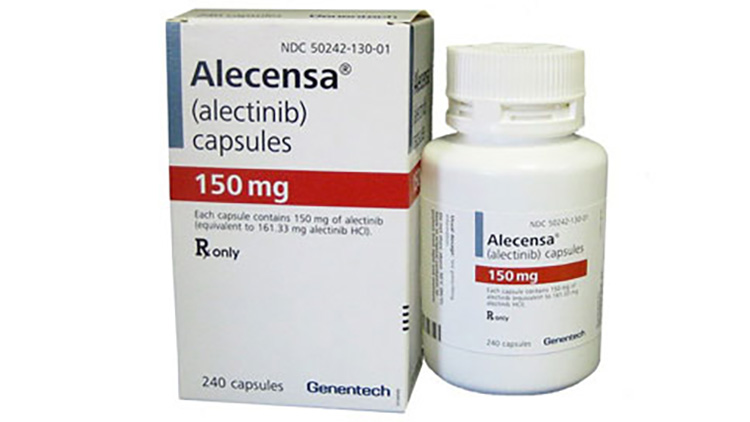Alecensa (alectinib) vs Krazati (adagrasib)
Alecensa (alectinib) vs Krazati (adagrasib)
Alecensa (alectinib) and Krazati (adagrasib) are both targeted therapies used to treat non-small cell lung cancer (NSCLC) with specific genetic mutations. Alecensa is specifically indicated for patients with anaplastic lymphoma kinase (ALK)-positive NSCLC and is taken orally twice daily, known for its effectiveness in treating both primary tumors and brain metastases. Krazati, on the other hand, targets KRAS G12C-mutated NSCLC, is also administered orally, and has shown promising results in patients with this particular mutation, which has historically been difficult to target with other therapies. Patients should consult with their healthcare provider to determine which medication is appropriate based on their specific genetic mutation and overall health profile.
Difference between Alecensa and Krazati
| Metric | Alecensa (alectinib) | Krazati (adagrasib) |
|---|---|---|
| Generic name | Alectinib | Adagrasib |
| Indications | ALK-positive non-small cell lung cancer (NSCLC) | KRAS G12C-mutated non-small cell lung cancer (NSCLC) |
| Mechanism of action | ALK inhibitor | KRAS G12C inhibitor |
| Brand names | Alecensa | Krazati |
| Administrative route | Oral | Oral |
| Side effects | Fatigue, constipation, edema, myalgia, anemia | Nausea, diarrhea, fatigue, liver enzyme elevations |
| Contraindications | Hypersensitivity to alectinib or any excipients | Hypersensitivity to adagrasib or any excipients |
| Drug class | Tyrosine kinase inhibitor | Kinase inhibitor |
| Manufacturer | Genentech (Roche) | Mirati Therapeutics, Inc. |
Efficacy
Alecensa (Alectinib) Efficacy in Lung Cancer
Alecensa (alectinib) is a targeted therapy approved for the treatment of non-small cell lung cancer (NSCLC) with specific genetic alterations. It is particularly effective in patients who have anaplastic lymphoma kinase (ALK) positive NSCLC. Clinical trials have demonstrated that alectinib is highly effective in shrinking tumors in ALK-positive patients. The ALEX trial, a pivotal Phase III clinical study, showed that alectinib significantly improved progression-free survival compared to crizotinib, another ALK inhibitor, in the first-line treatment of ALK-positive NSCLC. Alectinib has also shown activity in the central nervous system, which is beneficial as brain metastases are common in patients with ALK-positive NSCLC.
In addition to its efficacy in untreated patients, alectinib has also shown benefits in patients who have progressed on crizotinib. In these cases, alectinib can provide a meaningful response, potentially due to its ability to overcome some crizotinib-resistant mutations. The response rates and duration of response have been favorable, making alectinib a strong second-line option for ALK-positive NSCLC patients who have previously been treated with crizotinib.
Krazati (Adagrasib) Efficacy in Lung Cancer
Krazati (adagrasib) is a newer medication that targets KRAS G12C-mutated NSCLC. The KRAS G12C mutation is a driver mutation in a subset of NSCLC and has historically been challenging to target. Adagrasib has shown promise in early clinical trials, demonstrating an ability to shrink tumors in patients with this specific mutation. The efficacy of adagrasib in KRAS G12C-mutated NSCLC was highlighted in the Phase I/II KRYSTAL-1 trial, where it showed a notable response rate in patients who had previously received standard treatment, including chemotherapy and other targeted therapies.
While adagrasib is still under investigation, the preliminary data suggests it could offer a new treatment option for patients with KRAS G12C-mutated NSCLC, a group for whom limited targeted therapies exist. As of the knowledge cutoff date, adagrasib continues to be evaluated in ongoing clinical trials to further understand its efficacy and safety profile in the treatment of KRAS G12C-mutated NSCLC and its potential role in the treatment landscape for this challenging type of lung cancer.
Regulatory Agency Approvals
Alecensa
-
European Medical Agency (EMA), European Union

-
Food and Drug Administration (FDA), USA

-
Health Canada

-
Pharmaceuticals and Medical Devices Agency (PMDA), Japan

-
Therapeutic Goods Administration (TGA), Australia

-
Medsafe (NZ)

Krazati
-
Food and Drug Administration (FDA), USA

Access Alecensa or Krazati today
If Alecensa or Krazati are not approved or available in your country (e.g. due to supply issues), you can access them via Everyone.org.
How it works

Make an enquiry
Choose the medicine you want to buy, answer a couple of questions, and upload your prescription to speed things up. We’ll get back to you within 24 hours.


Make an enquiry
Choose the medicine you want to buy, answer a couple of questions, and upload your prescription to speed things up. We’ll get back to you within 24 hours.


Breeze through the paperwork
We'll guide you through the required documents for importing unapproved medicine, ensuring you have all the necessary information.


Get a personalized quote
We’ll prepare a quote for you, including medicine costs and any shipping, administrative, or import fees that may apply.


Receive your medicine
Accept the quote and we’ll handle the rest - sourcing and safely delivering your medicine.

Some text on this page has been automatically generated. Speak to your physician before you start a new treatment or medication.
Let's talk
If you have any questions, call us or send us a message through WhatsApp or email:
Contact us




